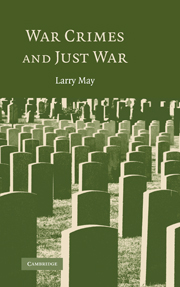Book contents
- Frontmatter
- Contents
- Acknowledgments
- War Crimes and Just War
- 1 Introduction: Justifying War but Restricting Tactics
- PART A A PHILOSOPHICAL GROUNDINGS
- PART B PROBLEMS IN IDENTIFYING WAR CRIMES
- PART C NORMATIVE PRINCIPLES
- 8 The Principle of Discrimination or Distinction
- 9 The Principle of Necessity
- 10 The Principle of Proportionality
- PART D PROSECUTING WAR CRIMES
- Bibliography
- Index
9 - The Principle of Necessity
Published online by Cambridge University Press: 05 June 2012
- Frontmatter
- Contents
- Acknowledgments
- War Crimes and Just War
- 1 Introduction: Justifying War but Restricting Tactics
- PART A A PHILOSOPHICAL GROUNDINGS
- PART B PROBLEMS IN IDENTIFYING WAR CRIMES
- PART C NORMATIVE PRINCIPLES
- 8 The Principle of Discrimination or Distinction
- 9 The Principle of Necessity
- 10 The Principle of Proportionality
- PART D PROSECUTING WAR CRIMES
- Bibliography
- Index
Summary
In this chapter, I will discuss the principle of necessity, which in previous eras was thought to be a cornerstone of Just War theory. The principle of necessity seems to be simple indeed. In situations where the only way to achieve military victory in a Just War requires the employment of a certain tactic, say the bombing of cities, then that tactic is justified regardless of other normative considerations. I will explain what the basis and limit of this principle are, arguing that the principle of necessity is not simple or easy to apply. I will also argue that this principle should be seen as subsidiary to the principle of humane treatment. Military necessity should be seen as a kind of emergency exception, at best, and not as a guiding principle of humanitarian law.
When people say that humanitarian law is different from human rights law, as we saw in Chapter 4, they are primarily thinking of humanitarian law's utilitarian-sounding principle of necessity that seems to justify almost any tactic, including intentional killing and torture, as opposed to the human rights not to be killed or tortured, which seem to prohibit these tactics in all circumstances. If we are going to bring these two important areas of international law together, we will need to reconcile such differences. This is one of the main tasks of this chapter.
- Type
- Chapter
- Information
- War Crimes and Just War , pp. 190 - 210Publisher: Cambridge University PressPrint publication year: 2007



